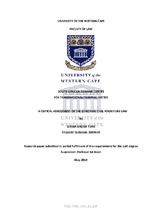A critical assessment of the Ethiopian civil forfeiture law
Abstract
Economic crimes pose a serious problem to the international community as a whole. Crimes,
such as corruption, money laundering, terrorist financing, cybercrime and drug trafficking
constitute obstacles to the development of a country, the free flow of trade, the fair
distribution of wealth and the well-being of all nations.1 Because of the systematic commission
of these crimes and their far-reaching effects, it is necessary to fight them with all appropriate
means.
For instance, the global community already has agreed on the seriousness of the
problems that corruption poses to the stability and security of every society.2 It has recognised
the fact that corruption weakens the institutions and values of democracy, undermines ethical
values and justice, and jeopardises sustainable development and the rule of law.3 Thus, its
members have agreed to co-operate in tackling it.

